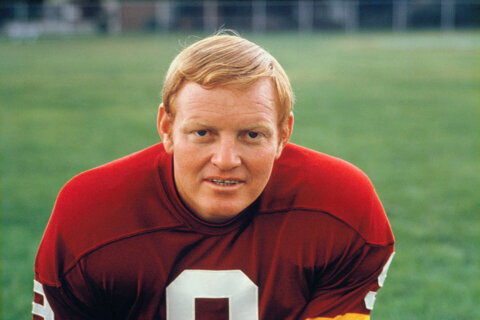WASHINGTON — The Washington Nationals’ 2015 season, their 11th in the nation’s capital, officially died Saturday at 7:08 p.m. Eastern Daylight Time. It was just shy of 154 games old.
The season itself came to its close midgame, as the New York Mets beat the Cincinnati Reds 500 miles to the west to clinch the National League East. But the Nationals played on in a purgatory of extra innings against the Philadelphia Phillies as rain dripped from the sky.
The Nationals are survived by those Mets, who are making their first postseason appearance since 2006 after capturing the division title nearly every expert ascribed to Washington prior to the season.
The 2015 season was born to reigning National League Manager of the Year Matt Williams on March 31 and struggled early in its life, not seeing the light of first place until adolescence, on May 19. It flourished for a time, remaining in first place or within a game and a half of the top spot all the way into early August, where dreams of October seemed inevitable, given the historically futile nature of this year’s National League East.
But in spite of Washington’s superior talent on paper, its refusal to treat its biggest threat to win the NL East — again, those Mets, who set up the top of their rotation to face Washington while the Nats sat idly by — as such, led to the division lead being squandered. A bevy of poor in-game management decisions made it readily apparent to anyone with a modicum of strategic baseball knowledge that the man on the bench in charge of such calls was woefully unequipped for the job.
Meanwhile, despite a payroll that had already pushed $165 million, fifth-richest in the game, ownership hamstrung the front office by not allowing any flexibility in picking up any salary. This limited potential acquisitions to those that could be made budget neutral for the remainder of the 2015 campaign, making Aroldis Chapman, or Craig Kimbrel, or Tyler Clippard, or Ben Zobrist, or Gerardo Parra unavailable. Instead, the club was left with noted malcontent Jonathan Papelbon as its only recourse.
Erstwhile closer Drew Storen, demoted to the eighth inning, imploded first on the mound, then off the field, punching his locker and prematurely ending his season. The Nationals, 53-46 prior to Papelbon’s arrival, have gone 26-30 since he’s donned the Curly W.
The bullpen was only one of the symptoms. After ranking second in the National League with a 3.00 ERA last year, the unit was fourth-best at the time of death with a 3.46 mark. But the starting rotation, thought to be one of the best in recent memory, ranked in the middle of the National League in ERA (6th), batting average against (8th), and home runs allowed (7th).
The lack of healthy position players was often pointed to as an excuse for the team’s underperformance, but the numbers show this team was just as potent as its 98-win predecessor. At the time of its death, the 2015 club ranked third in the league in runs scored and fourth in home runs, just as it did in 2014.
The season was nevertheless defined by underdiagnosed injuries and bullpen meltdowns, each of which seemed simultaneously shocking, yet predictable.
It was lost in spite of Bryce Harper’s brilliance, the comprehensiveness of which will undoubtedly win him his first National League Most Valuable Player Award.
But on Sunday, the season became undead. It rose from the crypt, led by zombie Jonathan Papelbon, a day shy of the four-year anniversary of his 2011 meltdown that cost the Boston Red Sox a playoff spot. Papelbon’s reanimated corpse decided to chastise Harper in the eighth inning, in a game that did not matter, for not running out a routine fly ball.
The two exchanged words, at which point Papelbon lunged down the dugout steps at Harper, grabbed him by the throat, and slammed him into the back, concrete wall. Teammates and coaches separated the two, but Williams was nowhere to be seen. While Harper came out of the game, Williams inexplicably sent Papelbon back out to pitch the ninth inning, where he promptly imploded into a human dumpster fire, surrendering two home runs as part of what would end up being an eight-run final inning.
When asked why he left Papelbon in a meaningless game after physically assaulting the most important player on the team, Williams responded in a way that showed him to either be a zombie himself, or perhaps the final, irrefutable piece of evidence that he is, in fact, a robot.
Full exchange between a reporter and Williams regarding Papelbon pitching the 9th. pic.twitter.com/mbgDfnBGdP
— Andrew Simon (@AndrewSimonMLB) September 27, 2015
“He’s our closer.”
Close it, Papelbon did — with fire. He pushed the blazing pyre of the entire season into the Anacostia, to drift aflame deep into the Washington night.
Later, Williams would claim to not have known the severity of the situation, despite meeting with Papelbon prior to the postgame news conference. This is either a laughably sophomoric lie, or even further indication of the complete meltdown of communication within the organization.
Someday, when the historians unearth the story of the 2015 campaign, they will marvel at the lost opportunities of this era of Nats baseball, and how it was allowed to be mismanaged — at every level — into its grave.
Rest in peace.







